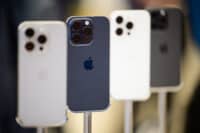 There is an emerging body of opinion that if the Hewlett-Packard Co. (NYSE: HPQ) board had not fired former CEO Mark Hurd then the company would have avoided the operational problems that have driven its shares to a nine-year low. The opinions are wrong. Hurd’s strategies actually contributed to the current trouble.
There is an emerging body of opinion that if the Hewlett-Packard Co. (NYSE: HPQ) board had not fired former CEO Mark Hurd then the company would have avoided the operational problems that have driven its shares to a nine-year low. The opinions are wrong. Hurd’s strategies actually contributed to the current trouble.
The major critic of the decision of the HP board to dismiss Hurd is actually Hurd’s new employer, Larry Ellison of Oracle Corp. (NASDAQ: ORCL). Hurd’s indiscretions were minor, Ellison claims. A small dalliance with a consultant and modest expense account fraud are not enough to sack a first-class CEO. Hurd is now co-president of Oracle, and Ellison is elated to have him.
Hurd built a new Hewlett-Packard between 2005 and 2010. The New York Times wrote that:
Mr. Hurd pulled off one of the great rescue missions in American corporate history, refocusing the strife-ridden company and leading it to five years of revenue gains and a stock that soared 130 percent.
But some of Hurd’s decisions have come back to haunt HP, and would have haunted him had he stayed. Some decisions that are brilliant one year are not brilliant as the years pass
First among the actions Hurd took was the HP buyout of EDS, the IT consulting giant. HP paid $13.9 billion for the company. And, this year, HP took an “impairment of goodwill” charge of $8 billion due to the purchase. Hurd moved HP further into the service business. But the EDS revenue and earnings were not immune to successful competition from companies such as International Business Machines Corp. (NYSE: IBM) and Oracle. A decision to expand HP that seemed brilliant at the time it was taken has turned out to be a mistake.
Hurd also could have done nothing to reverse the “commoditization” of the PC. A quick look at the earnings of Dell Inc. (NASDAQ: DELL) shows that. Perhaps HP could have offset the demise of the PC with a smartphone operation. It tried to with the buyout of Palm in early 2010 for $1.2 billion. The Palm devices and its operating system failed. HP tried to use the Palm OS in other products, and the results were a catastrophe.
Hurd did make several decisions at HP that helped the company. He cut billions of dollars in unnecessary costs. He cut the number of software applications HP sold and the number of data centers it operated. But these tactics could not have prevented HP’s larger problems of bad M&A and the storm that pressured PC and printer product margins.
If Hurd had stayed, he would have faced almost all of the challenges that now face current CEO Meg Whitman.
Douglas A. McIntyre
Are You Still Paying With a Debit Card?
The average American spends $17,274 on debit cards a year, and it’s a HUGE mistake. First, debit cards don’t have the same fraud protections as credit cards. Once your money is gone, it’s gone. But more importantly you can actually get something back from this spending every time you swipe.
Issuers are handing out wild bonuses right now. With some you can earn up to 5% back on every purchase. That’s like getting a 5% discount on everything you buy!
Our top pick is kind of hard to imagine. Not only does it pay up to 5% back, it also includes a $200 cash back reward in the first six months, a 0% intro APR, and…. $0 annual fee. It’s quite literally free money for any one that uses a card regularly. Click here to learn more!
Flywheel Publishing has partnered with CardRatings to provide coverage of credit card products. Flywheel Publishing and CardRatings may receive a commission from card issuers.
Thank you for reading! Have some feedback for us?
Contact the 24/7 Wall St. editorial team.




